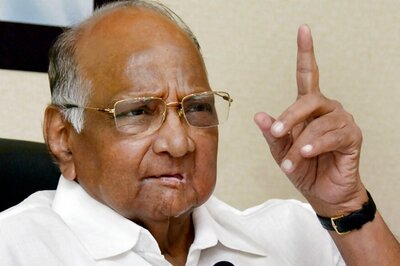
views
A term that keeps cropping up in public discourse is ‘crony capitalism.’ The Anil Ambani-led Reliance Group recently termed Congress president Rahul Gandhi’s allegations against him as “obviously patently untrue statements.” BJP leaders and ministers also deny the charges of crony capitalism hurled at them, claiming that they are honest and upright.
While corporate tycoons and top politicians slug it out over honesty and probity in public life, let us scrutinize the demon called crony capitalism.
Cambridge dictionary defines crony capitalism as “an economic system in which family members and friends of government officials and business leaders are given unfair advantages in the form of jobs, loans, etc.” The same dictionary defines capitalism as “an economic, political, and social system in which property, business, and industry are privately owned, directed towards making the greatest possible profits for successful organizations and people.”
A close examination of the two definitions shows that the two are mutually exclusive. If a system is such that property, business, and industry are privately owned and are directed towards making the greatest possible profits for successful organizations and people, it becomes undeniable that it would be predicated upon government’s zero or minimal role in economic activity. For great profits are not compatible with great government intervention.
Now if government plays little role in the functioning of the economy, which is the essential precondition of a capitalist system, government officials would be in no position to give such unfair advantages as contracts, loans, favourable debt restructuring, and concessions.
In other words, crony capitalism presupposes a system that is non-capitalistic. Therefore, the term crony capitalism should be seen as a case of bad etymology—that is, wrong semantic derivation from roots.
A common example of bad etymology is the word pedophilia, “the condition of being sexually interested in children, or sexual activity with children” (Cambridge). It comes from pedo meaning child and philos, loving. So, etymologically, pedophilia means love for children, which makes a pedophile a child lover. However, a person sexually interested in children can be called anything but child lover.
Similarly, a system in which crony capitalism is birthed and in which it thrives can be anything but capitalism.
It is interesting to note that the term crony capitalism was rarely, if ever, used in the pre-liberalization era. It was an era in which socialism was the dominant theme whose abominations were condoned, even justified, by almost the entire intellectual class.
The year 1991 was apocalyptic for this class. As if the fall of the Soviet Union, the end of the so-called Eastern Bloc, and China’s embrace of free market economy were not catastrophic enough, the PV Narasimha Rao government ushered in economic reforms and dumped some of the worst features of Nehruvian socialism. While many a parasite fattening on the licence-permit-quota Raj was hit financially, Left-liberals were enervated. Ideologically battered and psychologically shattered, they didn’t know how to react—much to the nation’s relief, for this meant that liberalization marched on for over a decade.
The impact of reforms on intellectuals was devastating. In their scheme of things, 1991 was the original sin and the capitalist, Lucifer. Everything that has gone wrong in our country since 1991 is attributed to that tectonic shift in the Indian economy—reforms. How do you explain a myriad of financial scandals ranging from the Harshad Mehta scam to coalgate and bank frauds? The standard answer you would expect from the intellectual is—market economy.
In his book Why Scams are Here to Stay: Understanding Political Corruption in India (2017), the prominent journalist N Ram, who is a well-known Leftist, wrote that corruption is “a normal, not an abnormal, condition within the political economy of capitalism.”
His verdict on the 1991 reforms is unambiguous: “Liberalisation has ushered in corruption in a much greater variety of forms and on an unimaginably greater scale than anything seen under the so-called licence-raj.”
In fact, professional revolutionaries blame everything on 1991. For instance, take the case of ‘paid news’—that is, media houses willingly and willfully publishing or broadcasting news for monetary considerations.
The standard intellectual explanation is: the age of mammon worshiping heralded by liberalization has destroyed all ideals and values, thus transmogrifying human beings into money-gobbling creatures sans moral compass.
The sum and substance of all the theories, doctrines, and myths propagated by intellectuals is that capitalism, which got a foothold in India in 1991, is the root of all evil in the country—indeed in the world. The use of the term crony capitalism helps them perpetrate and perpetuate their mendacity.
But, as we saw above, there is no such thing as crony capitalism. The truth—and, typically, intellectuals are loath to accept it—is that it is socialism that is prone to cronyism. The scams and other bad things like bad loans happen primarily because of socialism. The correct term is crony socialism. The cure is capitalism.
The author is a freelance journalist. Views expressed in the article are personal.




















Comments
0 comment